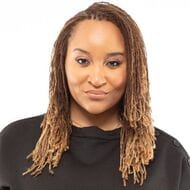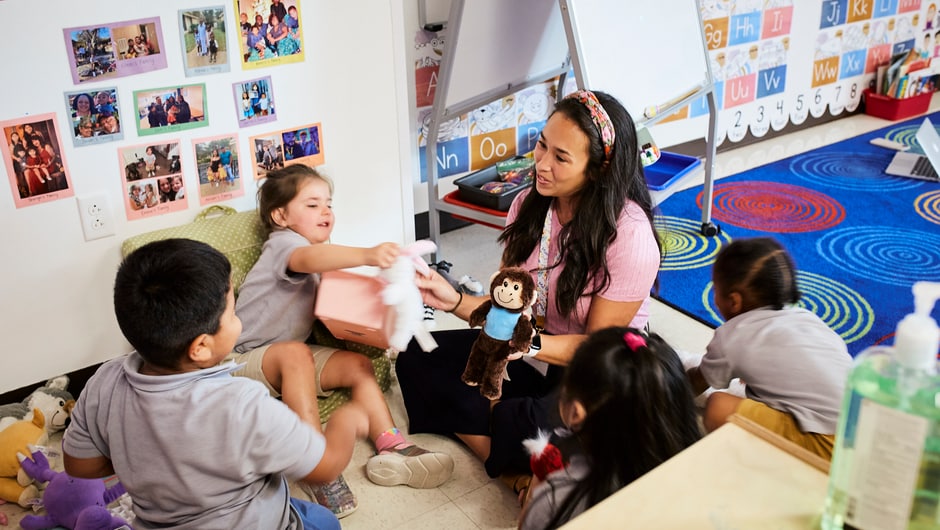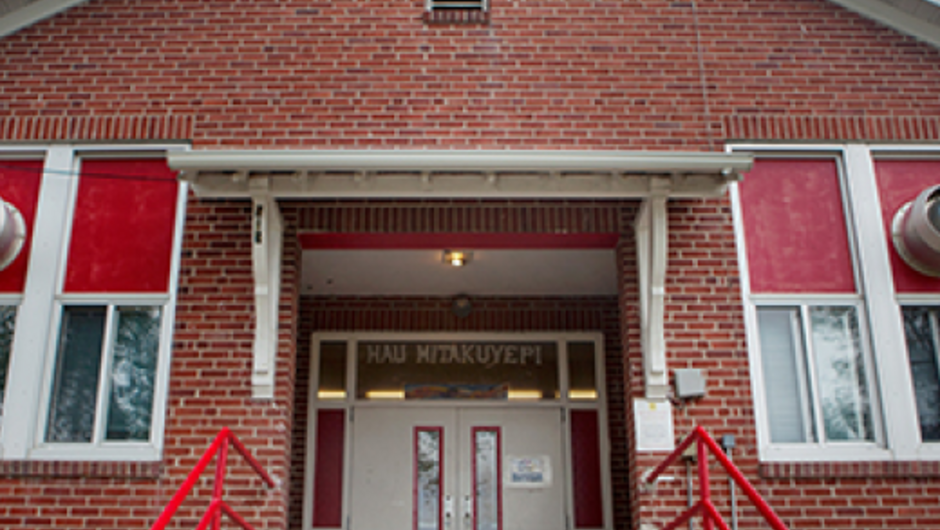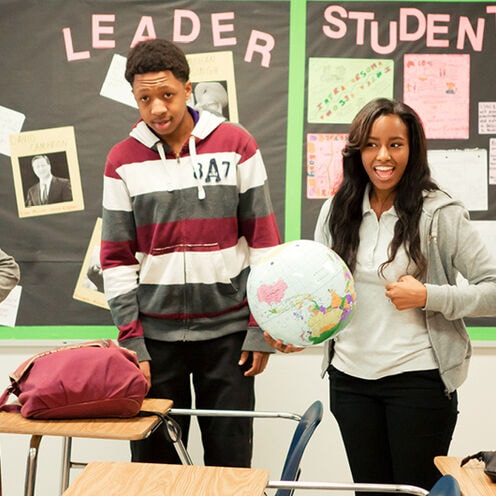
Boost Opportunities for the Amanda Gormans at Under-Resourced Schools
It is not a lack of talent that limits Black student brilliance, but a lack of opportunities and resources.
All eyes were on the U.S. Capitol as Kamala Harris was sworn in on Jan. 20, becoming the first vice president whose intersecting identities include being Black, Indian, and a woman.
Over the course of that morning, I found myself doubled over in laughter, thanks to Black Twitter’s posts about all things inauguration. From fashion, such as the color coordinated face masks and monochrome outfits, to Michelle Obama’s perfectly “laid” hair, the jokes were seemingly endless. Although I appreciated Black Twitter for being Black Twitter, I found myself most enamored by something else, someone else:
Amanda Gorman.
Gorman is supremely talented. Her poem “The Hill We Climb,” like lots of Black art, challenges us to fully consider an equity-based vision of the United States. Accordingly, she deserves all the good things, and I would like to see more of her. But I also found myself constantly disappointed by the number of tweets about Gorman that seemed to frame her as an exception for young Black people.
Far too many of the Twitter posts (and later news headlines) about Gorman praised her command of words, the quality of her writing, and her articulation in ways that felt underhanded. One problem with framing Gorman—and not just her skills—as exceptional or novel is that it ignores the fact that there are scores of other sharp, critical young Black people who would have and hold high-profile positions if they had similar opportunities to Gorman—and similar opportunities to those I experienced.
In a fury, I shot off what I thought would be another of my innocuous tweets.
But this tweet went viral. It clearly struck a chord.
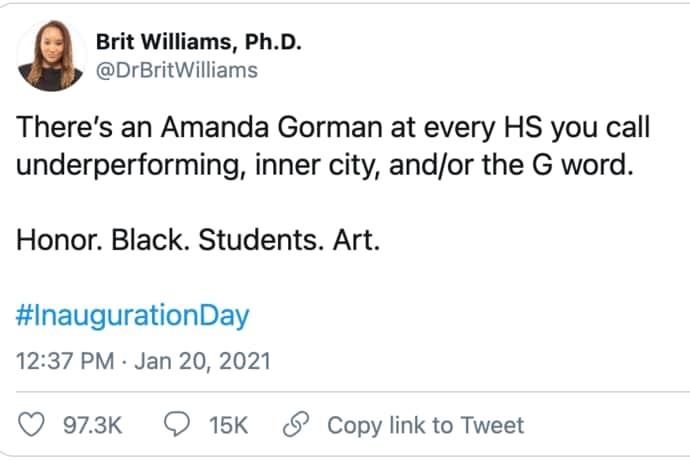
I wrote the tweet because I found who I am now at odds with who I once was. I wrote the tweet because I could both envision and not envision myself in Amanda Gorman’s shoes. I wrote the tweet because I wanted to shift the conversation to substantively consider Black girls who grew up like me but who never got the chance to become a woman with my resume. I wrote the tweet because it needed to be said.
Like many Black “gifted and talented” students, I attended some of the best post-secondary institutions one could imagine. Despite growing up low-income, Black, and hailing from an “underperforming, inner-city” high school (often nicknamed, “Thug High”), my resume now includes a bachelor’s from Hampshire College, a master’s from Teachers College at Columbia University, and a doctorate conferred by the University of Georgia’s College Student Affairs Administration program whose No. 2 ranking in U.S. News and World Report is only bested by the high number of Black doctoral students who successfully complete it. Like Gorman, I once wrote poetry and I was part of a spoken word team.
There I sat, during the inauguration, looking beyond our shared identities as Black women, seeing parts of myself in Gorman—at least momentarily. We share experiences of attending well-regarded post-secondary institutions and our love for the power of prose, but we had stark differences in secondary education. Those differences led to my tweet and my challenge to P–16 educators everywhere: It is time to redefine who is gifted and talented.
It is not a lack of talent that limits Black student brilliance, but a lack of opportunities and resources. Systemic racism, including school zoning and redlining, coupled with teacher bias and poor training, has profound impacts on the educational outcomes of Black students, especially Black girls. Given how often teachers focus on compliance rather than curiosity, students who find themselves relegated to schools filled with “resource officers,” metal detectors, and pedagogically underprepared classrooms may feel more policed and unsupported than they feel academically empowered. Worse yet, this focus on controlling Black students’ behavior leads us to miss their full potential, which can contribute to them feeling deflated and betrayed by the very schools tasked with their education.
If not for the disruptive, activist educators I encountered during my own educational journey, I may not exist before you nor would I be able to write these very words. Where my teachers who focused on control saw an “attitude,” my advocates saw passion. Teachers subscribing to the former mentality would seek to punish me via in-school suspension, while those committed to the latter insisted that I be placed on the school debate team and Academic Decathlon. Fast forward a decade and these same behaviors lead some people to label me as authentic while others continue to label me as a problem. This experience is not mine alone; it’s the very reason so many Black girls are pushed out of secondary and postsecondary education.
Students in schools and communities labeled “underperforming,” “inner city,” and “ghetto” need more opportunities, and our stories of Black excellence in schools require more nuance. Black brilliance is not, should not, and cannot be relegated to the few stories of the Black privileged poor, the Black elite, or even those whose parents have the resources and knowhow to place them into elite secondary schools. As educators, we owe it to our students—especially our Black students—to ask ourselves:
-
What do we mean by gifted and talented?
-
Who do we fully consider when we imagine gifted and talented youth?
-
How might one’s internalized biases, racism, and low expectations lead them to misperceive brilliance when it’s seated in a classroom (or on a Zoom screen) with them?
To riff off one of my favorite J. Cole rap verses, “Isn’t it ironic we’ve been sleeping on the students we’ve been dreaming about?” For this reason, the answers to these questions matter. How we frame our language regarding Black girl brilliance matters.
Now is the time to reconsider what we must do to fully see Black students’ brilliance, their humanity, and everything they have to offer. To execute that charge, we must reframe educational problems and their solutions. To do this, we must start by seeing the potential Amanda Gormans in front of us and providing them with the necessary tools and opportunities they need to flourish.
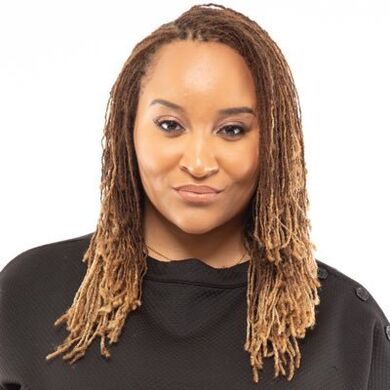
Our Inaugural Columnist
We are pleased to introduce Brittany M. Williams as One Day's first columnist. Her columns will appear monthly for the next three months. If you are interested in serving as a future columnist or would like to suggest someone, email us.
Brittany M. Williams, Ph.D. is a writer, speaker, and assistant professor of higher education who has the distinct privilege of having been born and raised in Southwest Atlanta. She is a proud product of Atlanta Public Schools. Williams researches social class, inequities, and the career development and workplace experiences of Black women in higher education contexts. Learn more about her at DrBritWilliams.com.
We want to hear your opinions! To submit an idea for an Opinion piece or offer feedback on this story, visit our Suggestion Box.
The opinions expressed in this piece, and all others in our Opinion section, represent those of the authors and do not necessarily reflect the views and opinions of the Teach For America organization.
Sign up to receive articles like this in your inbox!
Thanks for signing up!
Content is loading...


